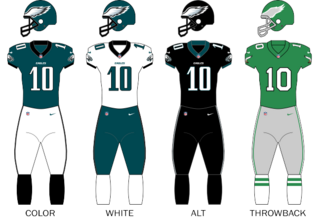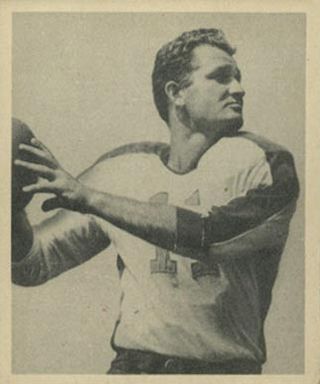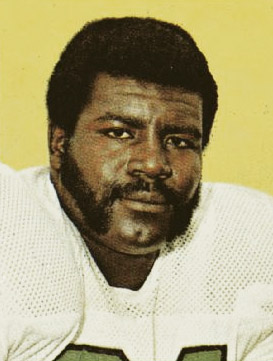Related Research Articles

The Philadelphia Eagles are a professional American football team based in Philadelphia. The Eagles compete in the National Football League (NFL) as a member of the National Football Conference (NFC) East division. The team plays its home games at Lincoln Financial Field in the South Philadelphia Sports Complex.
The Philadelphia / Baltimore Stars were a professional American football team which played in the United States Football League (USFL) in the mid-1980s. Owned by real-estate magnate Myles Tanenbaum, they were the short-lived league's dominant team, playing in all three championship games and winning the latter two. They played their first two seasons in Philadelphia as the Philadelphia Stars before relocating to Baltimore, where they played as the Baltimore Stars for the USFL's final season. Coached by Jim Mora, the Stars won a league-best 41 regular season games and 7 playoff games.

Franklin Field is a sports stadium in Philadelphia, Pennsylvania, at the eastern edge of the University of Pennsylvania's campus. Named after Penn's founder, Benjamin Franklin, it is the home stadium for the Penn Relays, and the university's venue for football, track and field, and lacrosse. Franklin is also used by Penn students for recreation, intramural and club sports, including touch football and cricket; it is also the site of Penn's commencement exercises, weather permitting.

Joseph Lawrence Kuharich was an American football player and coach. He served as the head football coach at the University of San Francisco from 1948 to 1951, and at Notre Dame from 1959 to 1962, compiling a career college football record of 42–37. Kuharich was also the head coach of the Chicago Cardinals in 1952, the Washington Redskins from 1954 to 1958, and the Philadelphia Eagles from 1964 to 1968, achieving a career coaching record of 58–81–3 in the National Football League (NFL).
The History of the Philadelphia Eagles begins in 1933. In their history, the Eagles have appeared in the Super Bowl four times, losing in their first two appearances but winning the third, Super Bowl LII, in 2018, and losing their fourth, Super Bowl LVII, in 2022. They won four out of the five NFL Championships they have been in, with the first three appearances happening in a row.
Jim Murray is the co-founder of the Ronald McDonald House and a former General Manager of the Philadelphia Eagles. A native of West Philadelphia, he is also president of Jim Murray Ltd, a sports promotion and marketing firm.

Leonard Hyman Tose was an owner of the Philadelphia Eagles from 1969 to 1985. He made a fortune in the trucking industry and was known for his lavish lifestyle but he eventually lost it all due to a gambling addiction and alcoholism.

Jerry Wolman was an American developer in Washington, D.C. and owned the Philadelphia Eagles of the National Football League in the 1960s.

Thomas Pryor Thompson was an American football quarterback in the National Football League (NFL) and Canadian Football League (CFL).
The 1948 NFL Championship Game was the 16th title game of the National Football League (NFL), played at Shibe Park in Philadelphia on December 19.
Bennie Bernard Williams is an American former football offensive tackle. He was selected by the Philadelphia Eagles of the National Football League (NFL) in the first round of the 1994 NFL draft and played for one season with the team. He was suspended by the NFL for violating the league's substance abuse policy after his rookie season and never applied for reinstatement. He later played for the BC Lions and Toronto Argonauts of the Canadian Football League (CFL), Memphis Maniax of the XFL, and Detroit Fury of the Arena Football League (AFL).

Richard Drew Harris was an American professional football player who was a defensive end who played seven seasons in the National Football League (NFL). He was an All-American in 1970 for Grambling and was selected in the first round of the 1971 NFL draft by the Philadelphia Eagles, the first defensive player chosen. Harris was named to the NFL All-Rookie team in 1971 and was widely regarded as one of the fastest defensive linemen in professional football before being hobbled by knee injuries.
The first National Football League (NFL) was the first attempt at forming a national professional American football league in 1902. This league has no ties with the modern National Football League. In fact the league was only composed of teams from Pennsylvania, which meant it was actually regional, despite having locations in the two largest cities in Pennsylvania. Two of the teams were based in Philadelphia, while the third was based in Pittsburgh. This NFL was a curious mixture of football players and baseball players who adapted to playing football. Future Baseball Hall of Famer Rube Waddell was with the Philadelphia Athletics, and pitcher Christy Mathewson a fullback for Pittsburgh. Two of the three teams were owned by the Philadelphia Phillies and Philadelphia Athletics, with the third team suspected of being owned by the Pittsburgh Pirates. The league folded after the 1902 season.

Alexis Thompson was an owner of the National Football League (NFL)'s Philadelphia Eagles, Pittsburgh Steelers, and Philadelphia-Pittsburgh Steagles. Prior to his executive career, he was a field hockey player who competed in the 1936 Summer Olympics for the United States team, which was eliminated in the group stage of the Olympic tournament. He played one match as forward.
Harry T. Gamble was an American football coach and executive. He was the head coach at the Lafayette College and University of Pennsylvania and general manager of the Philadelphia Eagles.

The Philadelphia Eagles Santa Claus incident was an incident that occurred during halftime of an American football game in the 1968 season of the National Football League (NFL) between the visiting Minnesota Vikings and the Philadelphia Eagles. The game itself is referred to as The Santa Claus Game.
Susan Tose Spencer is an American businesswoman, lawyer, and former vice president of the Philadelphia Eagles.
James P. Clark was an American political boss, sportsman, and businessman. He was a leader of the Democratic Party in Philadelphia and owner of the Philadelphia Eagles of the National Football League.
Francis Leo McNamee was an American businessman and government official who was regional director of the War Manpower Commission, president of United Artists and the Philadelphia Eagles, and commissioner of the Philadelphia Fire Department.
References
- ↑ Fitzpatrick, Frank (September 12, 2010). "1960 championship ignited Eagles fervor". The Philadelphia Inquirer . Archived from the original on January 16, 2014. Retrieved 2011-10-28.
- 1 2 "Philly Grid Franchise Comes Home". The Deseret News. January 15, 1949. Retrieved 3 February 2024.
- ↑ McKee, Don (December 5, 1997). "V.a. Mcnally, 94, 1960 Eagles Gm". The Philadelphia Inquirer. Archived from the original on January 16, 2014. Retrieved 2011-10-28.
- ↑ Warrington, Robert D. Departure Without Dignity: The Athletics Leave Philadelphia. Society for American Baseball Research, 2010.
- ↑ "Phillie Eagles of NFL Sold for Quarter Million". Herald-Journal. January 17, 1949. Retrieved 3 February 2024.
- ↑ "Eagles Name Clark". Middlesboro Daily News. March 6, 1953. Retrieved 3 February 2024.
- ↑ "Philadelphia Athletics Sought By Syndicate". Star-News. June 9, 1950. Retrieved 3 February 2024.
- ↑ Didinger, Ray; Robert S. Lyons (2005). The Eagles Encyclopedia. Temple University Press. pp. 127–128. ISBN 1-59213-449-1.
- ↑ Fitzpatrick, Frank (April 16, 2003). "Ex-Eagles owner Leonard Tose dies". The Philadelphia Inquirer. Archived from the original on January 16, 2014. Retrieved 2011-10-28.
- ↑ Bostrom, Don (January 19, 2003). "Eagles still a long way from matching 1948, '49 teams". The Morning Call . Retrieved 2011-10-28.
- ↑ "1985 Resolution FC-7*" (PDF). Constitution and Bylaws of the National Football League. National Football League. Archived from the original (PDF) on 7 March 2014. Retrieved 11 February 2012.
- ↑ "1996 Resolution FC-5" (PDF). Constitution and Bylaws of the National Football League. National Football League. Archived from the original (PDF) on 7 March 2014. Retrieved 11 February 2012.